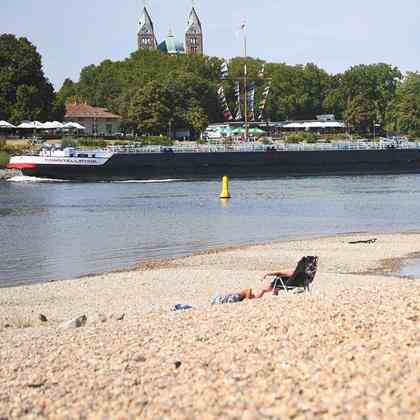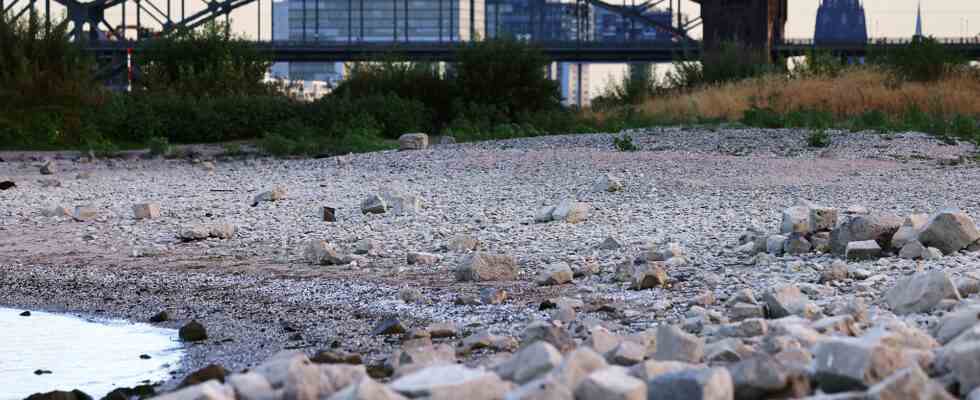As of: 08/09/2022 3:26 p.m
The water levels on the Rhine are so low that the transport of coal, for example, is made more difficult. Freight costs increase because raw materials or goods have to be distributed among many ships.
Actually, it is currently very idyllic on the Rhine near Cologne. The beaches are particularly large due to the low water and are well frequented in the blazing sun. However, the lack of water in the fairway is causing great concern to inland navigation operators. At the beginning of the week the level stands at 94 cm – exceptionally low for August. The average at this time of year is two to three meters.
Difficult maneuver for any captain
The push boats are high on the water. Even a layman can see that they are not fully loaded. “If you consider that the ships can normally load 2,700 to 3,000 tons, that’s quite a loss, of course,” says Rolf Nagelschmidt from the Waterways and Shipping Office of the City of Cologne, who regularly monitors freight traffic on the Rhine.
The office is responsible for the navigability and safety of the Rhine around Cologne, among other things. According to Nagelschmidt, it is important that the water level does not correspond to the water level. The actual water depth at the Cologne gauge is 1.11 meters greater than the gauge shown. But for every captain it is currently difficult to maneuver in the fairway, says the master hydraulic engineer. In order not to drive to the bottom, the skippers would have to reduce their speed accordingly.
Reduced production, higher freight costs
For large logistics companies like the HGK Group in Duisburg, there are currently quite a few challenges. With their deep-draft push boats, they can no longer approach ports such as Cologne or Leverkusen, but also Ludwigshafen and Mannheim, says Martina Becker, who is responsible for heavy shipping at the HGK Group. “This makes it difficult to serve some customers.” Some have already adjusted and throttled their production.
At the same time, the freight has to be distributed to more and more ships. “So almost everyone is fighting for the small space available in the water,” says Becker. And the freight cost increases. Half freight means a second ship, and with that the freight costs automatically doubled. In addition, even if the water levels are not as low as in the hot summer of 2018, when historic lows were reached – diesel prices are significantly higher today than they were then.
And all sectors are feeling the effects: car factories, chemical plants and steel works are supplied with raw materials or paints via the Rhine. The companies have to bear the costs. In addition, the demand for coal is increasing as coal-fired power plants are ramped up again. It is currently difficult to fill the heaps in front of the power plants, as is actually planned, says Becker.

Low water levels increase the risk of recession
The Rhine is one of the most important shipping routes in Germany. Raw materials such as grain, chemicals, minerals, coal and oil products are transported on it by cargo ship.
Economists now fear further losses for the already weakening German economy. According to experts from Deutsche Bank, Landesbank Baden-Württemberg and the Kiel Institute for the World Economy, if the water levels continue to fall, the risk of a recession will increase. Above all, the supply of the coal-fired power plants is at risk. They are increasingly needed for electricity production because Russia has throttled gas supplies.
Do waterways need to be deepened?
In recent years, low water levels have become more frequent, as Rolf Nagelschulte has also observed. He is responsible for excavating the Deutzer Platte in front of Cologne, so that the fairway remains navigable. Debris accumulates here regularly.
The Federal Association of German Inland Shipping (BDB) is demanding that bottlenecks be eliminated in view of the low water levels. Federal Transport Minister Volker Wissing (FDP) spoke out in favor of implementing the Federal Transport Infrastructure Plan by 2030 and deepening important waterways.
In Duisburg, the HGK Group is currently planning new ships that are specially designed for particularly low water levels – with less draft, but still plenty of cargo space. Two are already on the water.

